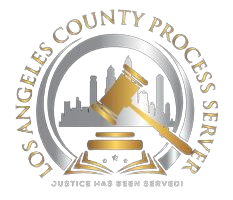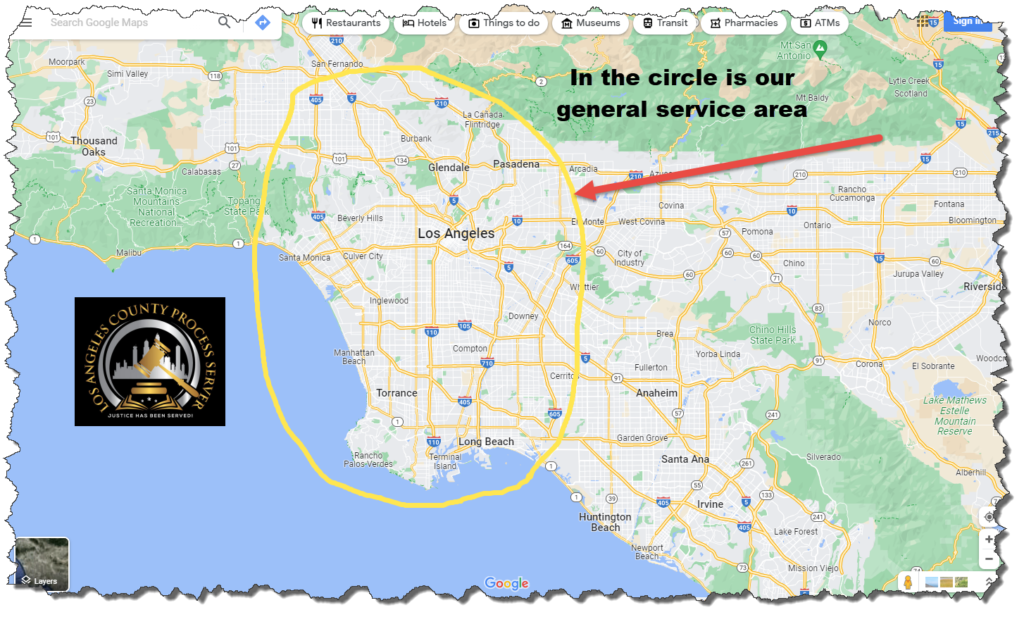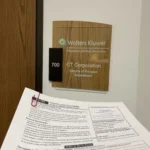Los Angeles Process Server Frequently Asked Questions
Common questions about a Process Server
A process server plays a very important role in the legal court process. Service of process is the procedure by which a party to a lawsuit gives an appropriate notice of initial legal action to another party, court, or administrative body in an effort to exercise jurisdiction over that person so as to force that person to respond to the proceeding before the court, body, or other tribunal.
NEED TO ORDER SERVICE CLICK HERE
An Affidavit of Service, also called a Proof of Service, is a signed document provided to you by the Los Angeles County Process Server. Your process server upon completion of serving your documents. Proof of Service states when, where, and who was served. There are a number of other affidavits that can be provided to you as a client. For instance, an Affidavit of Due Diligence may be provided if the person to be served cannot be located. and must be served by someone other than the process server. The process server will provide you with a Proof of Service that will list the documents served, from whom, at what date, and where. If your documents are served on behalf of someone else, such as a corporation or partnership, you will be provided with an Affidavit of Service on behalf of the person(s) who were served in addition to Proof of Service.
Process servers in California will deliver a variety of documents, such as: summons & Complaints; subpoenas; discovery documents; plaintiff’s claim order (small claims); unlawful detainers; orders to appear; wage attachments; bank levies, and landlord/tenant notices.
A process server will try their best to serve an individual or business. Being served by a process server can be an unsettling experience. If you’re unavailable for service, though, the court may grant an order for substituted service. In these cases, the suit may proceed without you.
It’s not illegal to dodge a process server who is trying to hand you court papers, but the truth is that avoiding the process server will just make the situation worse. Many times a process server that’s in your presence will use a technique called drop service. Drop service occurs when a process server places legal documents within the immediate vicinity of the person being served. As the name implies “Drop Service” The Process Server drops the legal documents at the subjects feet. This tactic is highly accepted by the courts.
Our hours of operation are as follows:
Monday through Friday 8 a.m. to 7 p.m.
Saturday from 8 a.m. to 5 p.m. most weekends
Close most Sundays but handle emergencies when necessary.
Contact us anytime if you have any questions at 310-800-2378
Click here to order service
We serviced just about all of the Los Angeles area. If you need service outside the area. Please do not hesitate to call. We are happy to make special arrangements for you.
A process server will use various means of research to find individuals they need to serve. While locating individuals, it is crucial that a process server strictly adheres to the law. If they miss any key steps of serving an individual or break any rules, they could risk having a court case thrown out.
YES, you can! We at the Los Angeles County Process Servers understand that your time is valuable. So we designed the ordering process to be fast efficient and stress-free.
Once you’re on the page just select the service needed fill out the form upload the necessary legal documents that need to be served to the person or individual then just pay with your credit card. If for some reason you do not see the service you need give us a call and will customize a service request for you for your convenience. We understand the legal process can be stressful so we try our best to make using our company stress-free. If you have any questions do not hesitate to call us anytime at 310-800-378
Yes, Los Angeles County Process Service Provides Proof of Service or an Authorization of Non-Service depending on if we were able to serve or not. But you have a client must record the documents with the court. We do not file proof of service with the court that’s the client’s responsibility.
We do not give legal advice, we suggest you always consult with your attorney or your legal counsel. The link below is to the Los Angeles Consumer Business Affairs website. This site has a wealth of information that might answer questions you may not even think to ask.
Los Angeles County Consumer and business affairs
A qualified process server should have the following skills:
- Ability to work under pressure
- Adaptability
- Attention to detail
- Investigative
- Legal knowledge
- Organization
- Professional
- Record-keeping
- Research methods
- Written and verbal communication
Occasionally a process server will need to present a report of their delivery. In rare cases, they will need to testify in court. This is only for certain cases and is not a regular part of a process server’s job. A process server should always take notes of their delivery in case they need to appear in court.
A process server will use various means of research to find individuals they need to serve. While locating individuals, it is crucial that a process server strictly adheres to the law. If they miss any key steps of serving an individual or break any rules, they could risk having a court case thrown out.
A process server works closely with legal professionals. They rarely work normal business hours due to the nature of the job. They often work weekends and weeknights since that is when they are most likely to find an individual. A process server will travel often since they need to hand-deliver legal documents. Some individuals are more difficult to locate than others, which makes this job both exciting and challenging.
First, a process server will check public records to find out where the recipient lives and works. If they cannot find the individual here or in their usual hangouts, the process server will use the skip tracing method. Skip tracing is when the process server collects information to figure out the recipient’s whereabouts. Information may come from sources such as credit reports, courthouse records, loan applications and even department store loyalty cards. The process server must acquire all of this information by legal means.







